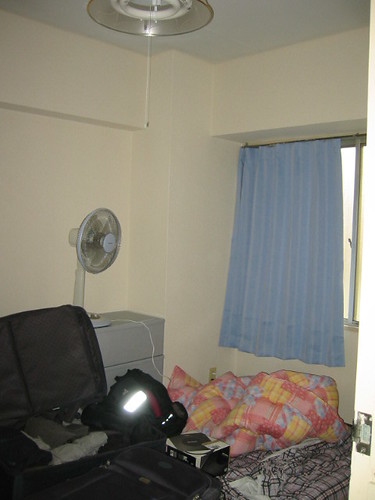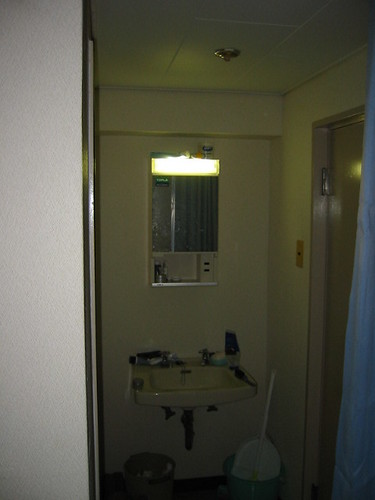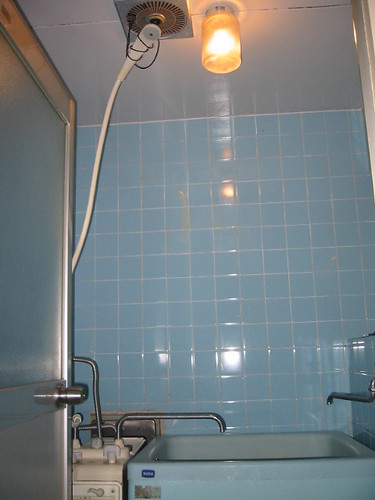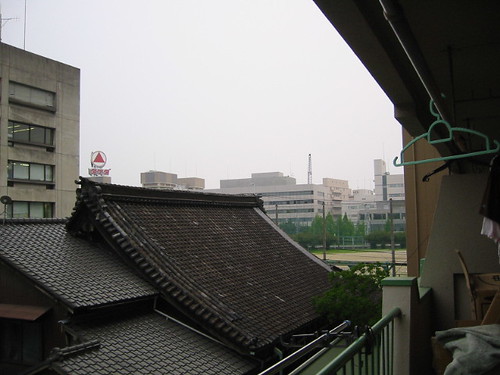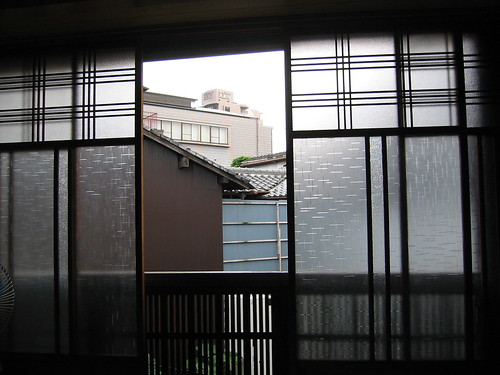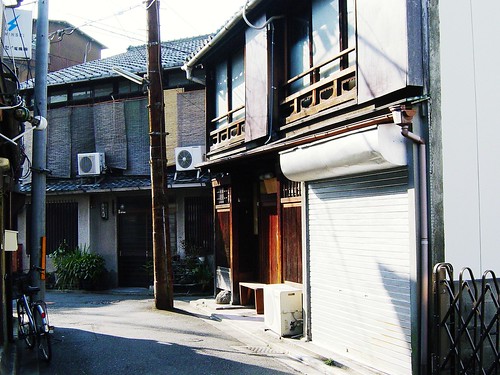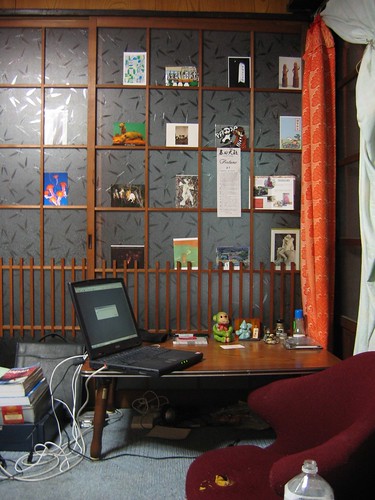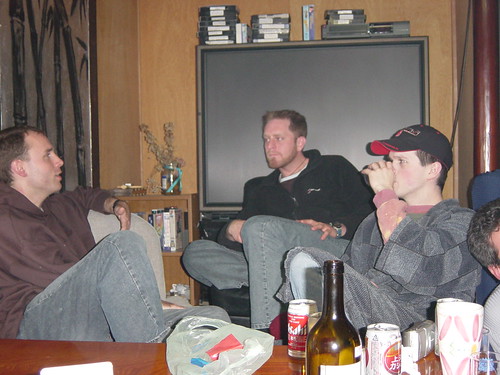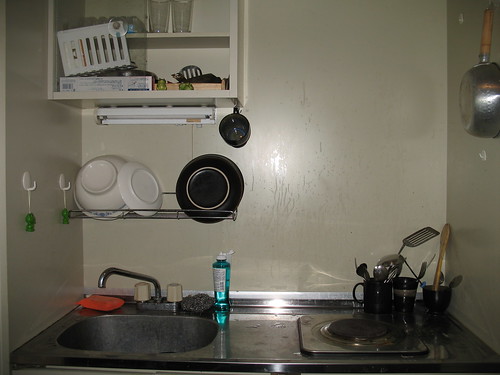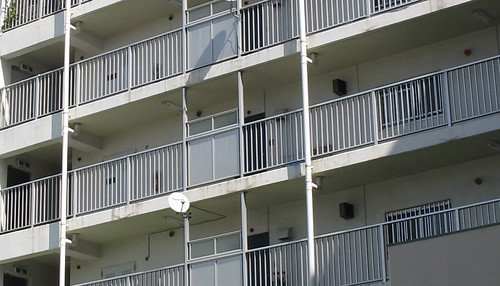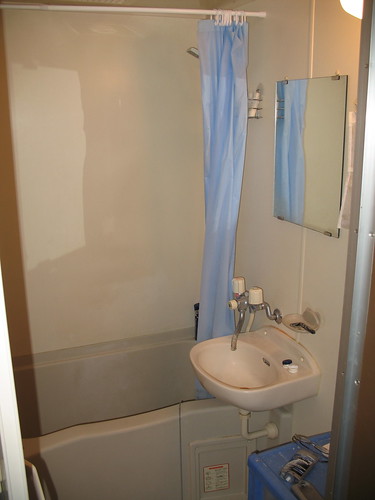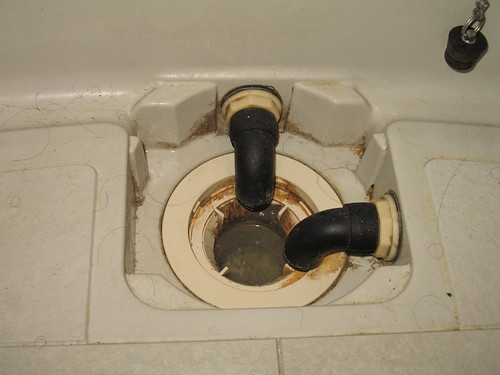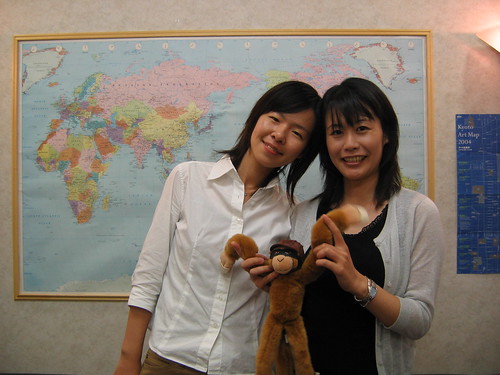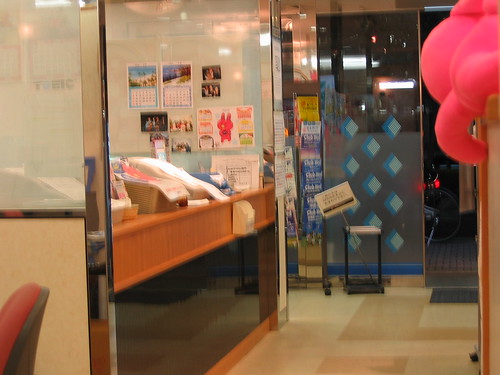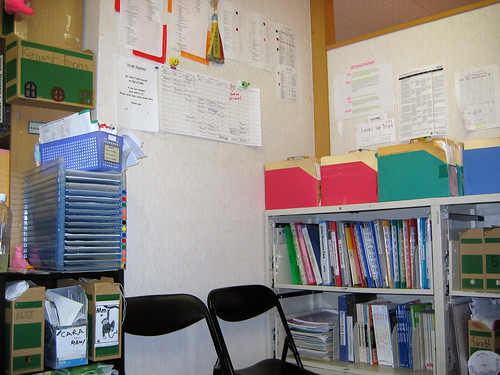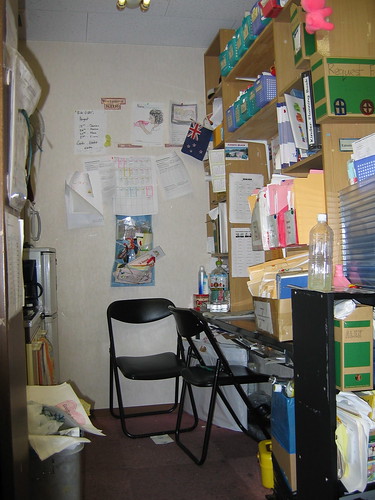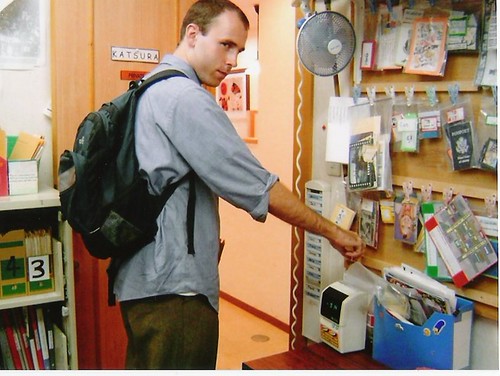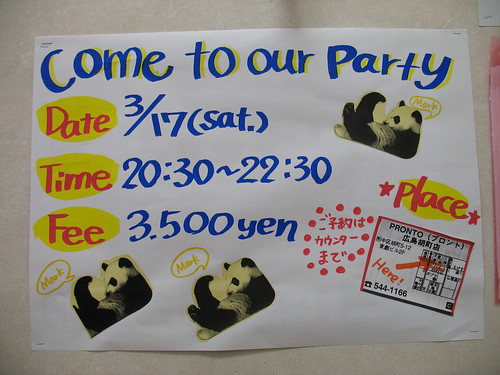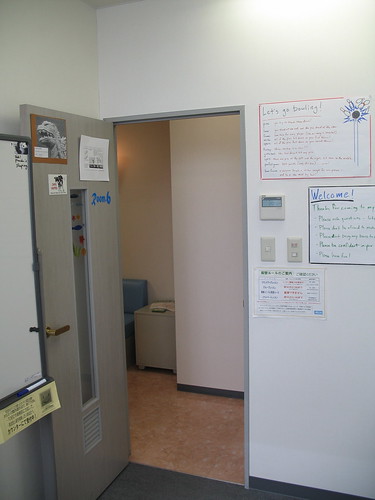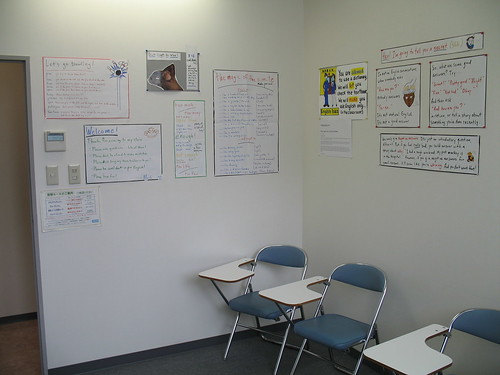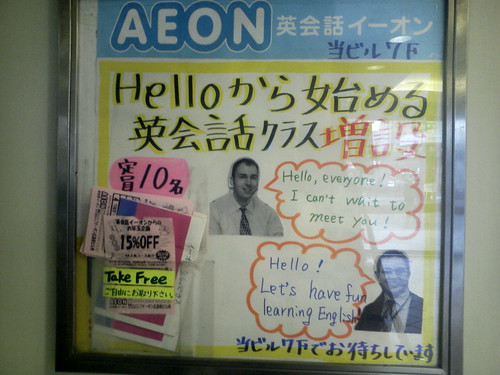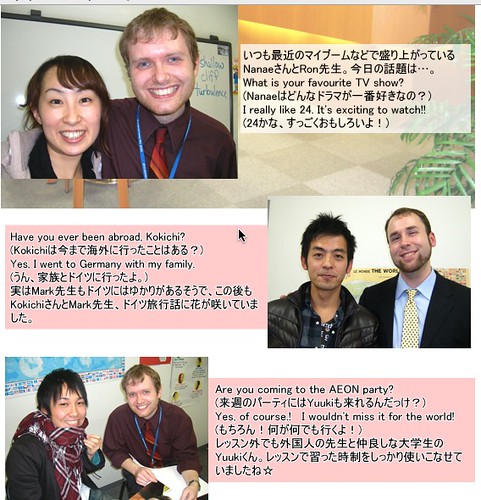February 8, 2009
I wrote this a couple years ago, while I was working in Hiroshima. A friend asked me for information about teaching in Japan, and I figured I'd try to go into enough detail that it might be useful for posting on the web. Time has made this guide less useful — NOVA, one of the two schools I described in detail, has gone belly-up. While working there, we always said they had an implausible business model, and as it turns out, they did. But I think the NOVA sections still apply in a general sense to many of the fast, cheap, and out of control English jobs one finds in Japan. (You could probably apply most of what I've said about NOVA to GEOS. Dunno what the situation is with G-COM, the company that assumed NOVA's trademarks.)
I haven't updated the text from what I wrote in early 2007, save for HTML formatting and some photos. The first half of the guide is mostly technical and would only be of interest to someone considering doing the same, but the second half has a fine selection of photos, anecdotes, and gripes that should amuse general audiences, so skip ahead if you like.
TEACHING ENGLISH IN JAPAN: A GUIDE
In the first half, I'll outline the basic facts about teaching in Japan, with links to the various schools and some other web resources. In the second half, I'll discuss my own experiences with two of the major schools in Japan and try to give you a sense of what to expect in terms of the work life.
I should note that I don't consider myself a teacher. I was always a pain in the ass when I was in school, and I'm sure that every one of my old teachers would have laughed (or growled) if they knew I was spending my days trying to coax English out of a bunch of blank-faced students. From the beginning, I saw teaching in Japan as a means toward traveling in Japan. Simply put, it's a lot of fun to travel in Japan, and it was worth any peace of mind I had to sacrifice (by teaching) in order to do it. If your main interest is beginning a career as a teacher, teaching in Japan isn't really worth your while - at least not as described here. This isn't teaching as you remember it from school. You'll get some sense of how to manage a classroom, but that's about it.
So, without further ado...
QUALIFICATIONS
You don't need to speak any Japanese to teach English in Japan. You don't need any teaching experience, either. All you need is a university degree, in any subject at all. I've worked with art majors, English majors and computer science majors. As long as you've graduated — and you're a native speaker of English — you can teach English in Japan. Don't worry about age, either. Although most of the teachers are somewhere in their twenties, I've never detected any kind of age bias coming from any of these schools. As long as you're well-kept and you can convince them that you'll take direction and you'll stay at least a year, they'll be satisfied. There was a grandmother at one of our schools, and it was great to have her in the teachers' room.
English schools in Japan are big business. They're called eikaiwa, which translates to "conversation school". The theory behind eikaiwa is that Japanese students have studied English grammar and vocabulary in high school, but because of the memorize-and-recite / test-based style of the Japanese school system, they never really learn to speak the language. So they have the pieces, but they've never used them — kind of like memorizing an instruction manual without ever having played the game. And that's where eikaiwa come in. Eikaiwa supply a Real Native Speaker, who conducts the lessons entirely in English — no Japanese is supposed to be used in class — and the student knows they're getting Real English, as opposed to the cocked-up stuff their high school teacher tried to pass off on them.
This works better in theory than in practice, of course. Students may or may not remember any English from high school, and they may or may not put in any time outside of the eikaiwa classroom studying what they've learned. They have a lot of different goals: to escape boredom, or to get a better test score for a promotion at work; to use English while traveling, to hang out with or date or procreate with foreigners, to do better on their college entrance exams, because their parents told them to, because their psychiatrist told them to, because they use English at work or they'd like to use English at work. (And yes, those are all based on real people I met.) Above all, they're sold a flashy, glamorous Exciting Foreign Life experience that just happens to come in the form of a school — and you.
So, in practice, you'll have several classes of students of different ages whose goals are at cross-purposes, you'll have faintly ridiculous textbooks that may or may not have been written for these purposes, and you'll churn out lessons like McDonald's churns out burgers. If you're laid-back, you're patient, you have a sense of humor and you don't mind improvising (or, less gracefully, making shit up off the top of your head), then you'll be fine. There will be days when you want to throw a brick through the window, but there will be more days when you wonder why you're getting paid for something so easy.
GETTING A JOB
There are a few big eikaiwa and a lot of small ones. The big ones hire from overseas, so that's how most people start. It's possible to arrive in Japan, find a job with a small eikaiwa, and get your new employer to sponsor your work visa, but it's expensive and risky. You can run out of money fast, and if you're already in Japan when you get the work visa, you have to leave the country and then come back in to activate it. (The upside, however, is that the small schools often have better work conditions than the big ones. So that's the trade-off.)
If you're hired by one of the big schools, they'll take care of the paperwork and walk you through the visa process while you're in your home country. You'll be on a one-year contract, which can be renewed upon mutual agreement by you and the school. Generally speaking, you have to be a pretty big fuck-up not to be offered renewal. It saves the schools a lot of hassle not to have to train a new teacher every year.
Contracts in Japan are a little different from what you may expect, though. The contract can be broken by you, at any time, with no legal penalty. The school, on the other hand, cannot fire you without paying you a huge severance bonus, no matter what you do. (At worst, they'll transfer you to a really crappy branch to wait out the rest of your contract.) Some schools build in an end-of-contract bonus to keep you locked in for the whole year. Other schools don't, though, and plenty of teachers leave after a couple of months to find a job with one of the smaller schools that can't afford to hire from overseas. The main hassle is getting that work visa. Once you have the work visa, it doesn't matter who first sponsored it; you can work for anyone with it.
Right now, work hours are in flux at the various schools. Some are on a 29.5 hour schedule, and others are at 36.5 or 37.5, which are essentially standard 40 hour work weeks. (Schools cook the numbers for legal reasons. It's all to do with Japan's archaic pension system and who's considered a full-time worker.) In practice, you work eight hour days, five days a week. You're not likely to have Saturday and Sunday off, although it's not inconceivable that you would have Sunday and Monday off. Most people work from 1-9pm, with enough time set aside for lunch. If you're on the 29.5 hour schedule, then you'll have some break time in there as well, and you can use that as you please. Some schools give you 'office hours' for prep time, and others say they don't require prep, so they don't give you time. It's Japan, so inevitably, you'll wind up doing a bit of work outside paid hours. How much depends on how hard you hold the line with your staff.
MONEY
Japan is a good place to make money, as long as you're not supporting a family. You can either live like a monk and save a ton or go out every night and still save a bit. You learn ways to save money pretty quickly; even in Tokyo, cheap meals and furnishings are easy to find. The private schools described below pay a standard base rate of Y255,000. Some tack on extras: NOVA, for example, has to pay you a little extra if you work on a Sunday, and if you live in an expensive area like Tokyo, you'll get a small cost-of-living bonus. Other schools might subsidize the cost of your apartment. If you have to commute to your school, then the school will pay for your bus / train pass. If you're from the US, Japanese income taxes are gentler than those at home, and you won't have to pay income tax on what you make. (Unfortunately, I don't know about the tax rules for other countries.) If you're paying off debts back home, it's fairly easy to send money back to a bank account. There are a few ways to do it. GoLloyds (http://www.golloyds.com) is the easiest.
Travel within Japan was my priority during my first tenure, and I did plenty of that. Travel outside Japan was my priority for the second tenure, and I've managed that as well; budget properly and you can pull off two or three overseas trips during a year.
LIVING
If you're getting hired from overseas, the school will hook you up with an apartment. And that's a good thing — getting an apartment by yourself can be a weird, byzantine process involving multiple deposits (some refundable, others not) made to various parties and a lot of rent paid up-front. ('Key money' is a dread term.) There are landlords who are comfortable dealing with foreign residents, and decent apartments are sometimes passed from one teacher to another. But it takes some time to ask around, and you wouldn't want to have to deal with it upon arrival in the country.
So you'll start in a school apartment. You might have it to yourself, or you might have roommates. It'll be furnished with a TV, VCR, basic kitchenware, a new futon and whatever has accumulated from the teachers who preceded you (often a few old futons). Some schools let you move out of the apartment with one month's notice, and other schools build the apartment into your contract. They're not necessarily company apartments, though. It's likely that most of your neighbors will be Japanese people who have nothing to do with the school. Your bedroom might have tatami floors, or it might not. I've seen a wide range of nice-to-crap apartments. Schools provide varying levels of support, but it's in their interest to get you settled in, so they're at their most helpful in the first couple of weeks. Teachers are also pretty good about helping each other find the grocery store, the transportation, and all of those basic amenities.
If you're hired, the school will ask you for a wish list of locations within Japan, and they'll try to accommodate you based on that. I got my first choice the first time I worked in Japan. For the second time, the interviewer just asked me about places I'd been in Japan and liked, and then he offered me a placement based on that conversation. It worked out fine. I've heard stories about people asking for Tokyo and getting the middle of nowhere (and vice versa), but it didn't happen to me or anyone I knew.
You can get by with very little Japanese in your daily life. Of course, it helps to learn — and there are plenty of relatively cheap classes and tutors — but there's no pressure. Some employers might compliment you on it, and others will have no interest whatsoever. Plenty of people survive the whole year (or two) by pointing, grunting, and placing the burden on the friendly Japanese waitress to understand them. In major urban areas, it's pretty effortless to live without knowing any Japanese. In a rural area, it'd be tougher. I knew a fair amount of the language, but I was far from fluent, and I never had an obstacle of any significance.
THE INTERVIEW
Schools want people who are friendly, patient, confident with speaking and genki — meaning that you have a good attitude, you can put people at ease, and you seem eager, happy, cheerful and fun. (When in doubt, err on the side of being a Muppet.) Personality goes a long way. It's not necessary to have a strong knowledge of English grammatical terms, although some schools will make a show of testing you during the interview with a quiz. It's just a show. During training for my first job, another trainee asked me in total seriousness what a 'verb' was. (She was hot, and I am smart. Hey, fair enough.) As I said, you need a college degree, but it doesn't matter what the degree is in. Former art students were among the best teachers I met.
The schools also want to know that you're not going to flip out when you're living in a foreign country, away from your friends and family. There are some people who really struggle with that. Most are fine, but the small handful of flame-outs are spectacular enough to keep the recruiters on edge. The recruiters get hammered if they send over a bad recruit, so they have a lot at stake with their choices.
If you're determined to get the job, drop these points in the interview:
1. You enjoy meeting new people;
2. You're flexible, you can adapt your style, you take direction well, and you like working as part of a team;
3. You had a job or a project once where you took direction from a person who was senior to you, you learned a lot from that senior person and you followed his or her directions unquestioningly, and the project was a success;
4. You're always on time;
5. You're keen on little art projects that could be used as lesson supplements;
6. You think Japan is interesting, and you'd love to learn more about Japanese culture; (Careful with this, though. Don't appear as though you already know too much about Japan. A certain kind of student who frequents these schools is hell-bent on educating foreigners about Japanese culture, and it just pisses them off if the foreigners already knows.)
The above should seal the deal. But if you're desperate and you want to absolutely guarantee you'll get the job at any cost:
7. Tell them you love teaching kids. Kids classes make a ton of money in Japan. I would never, ever teach one myself, but...
THE SCHOOLS
Here's the spread of schools that hire from overseas, as I know them:
http://www.teachinjapan.com
This is the website for NOVA, the first school I worked for. They have recruiting offices everywhere, and they're easily the biggest school in Japan, so they hire the most people. (EDIT 2009: since they're bankrupt, that web address is no longer maintained by NOVA. Try https://www.gcom-nova.jp/form/index.shtml.)
http://www.geoscareer.com
GEOS is the second biggest private school in Japan, but their reputation is abysmal. I would avoid them.
http://www.aeonet.com
AEON is the second school I worked for. They have fewer teachers and fewer branches than NOVA or GEOS, so they're more selective. But they're in every major area, and they hire from Canada, America and Australia. (In that order of frequency, based on my experience.)
http://www.japanbound.com
ECC is the last of the "Big Four" private schools. They have offices in Canada and Los Angeles, and occasionally from within Japan. I've heard that their interviews can be very long and involved, over the course of a few days. On the plus side, their reputation is easily the best of any of these schools, and their vacation time is awesome.
http://www.jesjapan.com
James English School is unique in that they will hire based on phone interviews, although they ask for a video, too, if possible. They only have schools in northern Japan.
There's a school called Interac whose website I won't bother to dig up because their reputation is so bad. Berlitz is a dying breed, but they're in a few cities, too.
The JET Programme (http://www.jetprogramme.org) places applicants in public high schools around Japan to serve as teaching assistants (in practice, the Japanese teacher points at you, and you say an English sentence out loud, and the students repeat after you). I know very little about it. The JET teachers have kind of a parallel existence to the eikaiwa teachers; we don't see much of each other. They get paid better and have more vacation time, and often do less work. However, they have to apply over a year in advance, and they're far more likely to be placed way out in the boondocks. Their web forum is called Big Daikon (http://www.bigdaikon.com).
OTHER WEB RESOURCES
http://vocaro.com/trevor/japan/nova/level_up.html
This is a website written by a former NOVA teacher. It's a few years old now, but it was the one I read when I was deciding whether to go the first time, so I'm fond of it. Lots of evocative photos.
http://markcity.blogspot.com/teaching.htm
This is another good essay about life as a teacher, also at NOVA.
Gaijin Pot (http://www.gaijinpot.com) is a bigger, more formal, thorough teaching in Japan web forum; Let's Japan (http://www.letsjapan.org) is smaller, less formal and funnier.
OTHER COUNTRIES
The only country that compares to Japan in terms of ease of arrival is Korea. Their schools are called hagwon. They pay a little better than Japan, but the quality of life is widely agreed to be lower, and there are more shady schools over there — foreign workers aren't as well-protected as they are in Japan under labor laws. Still, it's possible to find a reputable employer and do the same deal there as I described in Japan.
I've seen at least one school with the same set-up in Indonesia, but I don't know anything about life there. Most teaching jobs in China are through universities. I was offered a job at a rural university in China before I came back to Japan for the second time, but I decided against it. A lot of the China jobs seem to cover room and board at 100% but pay only a small wage outside of that, and I didn't like that level of dependence. In Europe, teaching jobs seem to go exclusively to EU citizens who have teaching certificates.
If you want to investigate teaching opportunities in a specific country, check the forums at Dave's ESL Cafe (http://www.daveseslcafe.com).
AFTER JAPAN
When you go home, you'll discover that your public speaking skills have improved. You'll be able to make engaging conversation with absolutely anyone you meet. (Good for parties.) You'll be better-equipped to handle weird and stressful situations as well.
When you're looking for a job, however, you might as well have been traveling for a year. Future employers won't hold working in Japan against you, but the experience in Japan won't mean anything much in professional terms, unless you come back fluent in Japanese and you want to be a translator or something like that. I eventually managed to spin the experience from my first school in a business-training direction and got a training job that way, but it took a long time, and it was as much a matter of being in the right place at the right time as anything else.
The adjustment back home again can be hard. For me, it was harder than the adjustment to Japan. Make sure you have some money saved when you leave. Being stuck at your parents' place will only make it worse.
HOW IT WORKED OUT FOR ME
I'm better at complaining than I am at praising, so the list of problems will be longer than its positive counterpart. Take it all with the proverbial grain of salt.
I had an amazing time in Japan. Again, the experience was more than worth the trials and tribulations. Many of the best memories I have are from Japan. There's just so much more that you can do when you're living in a country as opposed to just passing through — a whole new side of the culture opens up to you. I would recommend against thinking strictly in terms of one year, though. It does take about six months to hit your stride. Go, play it by ear and see how you feel after six months or so, then decide whether you're going to stay any longer. One of my few regrets is that I left too early the first time I was there.
I've lived in Japan twice. The first time was for a job with NOVA. I was teaching in a suburb of Kyoto called Katsura. My NOVA apartment was in Osaka, about 35 minutes from my school by train. It was a three-bedroom apartment, with about the same amount of total living space as you might expect from a one-bedroom apartment in America. I shared the apartment with two guys who worked at different NOVA schools. In bigger cities, those apartments tend to have a revolving door — because the apartments are kind of a rip-off and people can't live in them after they quit NOVA, there's someone new moving in every couple of months. I can imagine that would get old after a while.
Some NOVA apartment photos:
My bedroom in my first apartment.
The sink between the shower room (left) and the toilet room (right).
Our Japanese-style shower room.
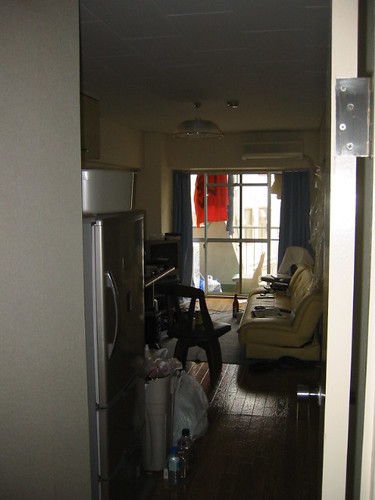
Our living room (fridge/kitchen off to the left).
View from the balcony. The washing machine (no dryer) was out here.
After a month, I moved to a house in Kyoto. "Gaijin houses" can vary in quality, but it's easy to get a sense for one if you just stop by. I found a great one, and that's where I spent the rest of my first trip to Japan. Again, people were coming and going, but not quite as often, and they were carefully screened by the landlord. There was a lot more space and privacy. (Cheaper, too.) A handful of photos:
View from my first bedroom window.
Our front door.
My first bedroom.
My second bedroom.
Also from my second bedroom.
Talking shit in the living room with Adam and Alex.
When I came back for the second time, it was with AEON in Hiroshima. I had a one-bedroom apartment within a short from my school. Since the apartments are not as revolving-door as the NOVA ones, teachers occasionally leave some decent stuff behind for each other. I got more kitchenware than I have any use for, and also a Casio keyboard. Others have picked up microwaves, ovens, Western-style beds and other furniture. The apartment was nicer than the first set of pictures posted above, but in the same range:
Kitchen.
Neighbors.
Shower room.
The Sarlacc Pit. Water from the shower exits through one pipe, and water from the sink through the other. It's supposed to have a cover, but the cover was missing, and we could never find one that fit.
AEON and NOVA have their good points and bad points. In the final estimation, I think they probably even out. If you apply to any of the other schools, ECC is likely to fall closer to AEON in terms of benefits and drawbacks, and GEOS aligns closer to NOVA. In sum, I had more work and less responsibility at NOVA, less work and more responsibility at AEON. I go back and forth on which one I preferred. Draw your own conclusions...
SOME BASICS OF NOVA LIFE:
Because they're the biggest school and they have the most locations, they're most likely to be able to place you where you want to go. NOVA will provide you with an apartment and deduct the rent from your salary, but you can move out with one month's notice. (That's a good thing, because they are notorious for overcharging for rent.) You teach classes of 1-4 students, 40-45 minutes each, from pre-planned lesson scripts that range from semi-adequate to awful. You won't know your schedule until you walk in on any given day. You'll have 10 or 15 minutes between classes to find the files for your next group and choose a lesson that works for all of the students (or as many as possible). The students are separated into eight ability levels. They don't take the lessons in sequence, and while some have regular days when you can expect to see them, others call up to book lessons whenever the thought occurs to them. Since they don't know what lesson they'll be doing, there's not a lot they can do to study outside of class.
You'll have anywhere from 2 (rare) to 30 (extreme) foreign co-workers. (I had 11-13 at my branch.) They don't give you a completion bonus or airfare, so you can leave whenever you like. Turnover at NOVA is quite high. To make them happy, give one month's notice that you're leaving. They do write decent recommendation letters if a future employer goes to the trouble of asking for one.
Among NOVA's good points:
1. The lessons require no preparation or thought — you can just read a script, basically, nod and praise at the correct intervals, and you never have to notice you're teaching a lesson. You may need to put in a little extra time during your first couple of weeks to familiarize yourself with the lessons — because from day one, you're expected to be ready to teach every lesson for every level — but there's nothing else to do. There's a little bit of paperwork between lessons, but you can always clock out on time at the end of the day. All you do is teach. Students don't turn in any kind of homework to you, either.
2. Since NOVA is the biggest school, they attract the widest range of students. Whatever your interest, you're likely to find a few students who share it. I've already been back to visit my old students once, and I'm sure I'll do it again in the years to come.
3. Similarly, you'll have a lot of foreign co-workers, and that gives you a better chance of meeting people you really like. There were a couple of idiots at my school, but for the most part, the group we had was amazing — creative, smart, funny, awesome people, interested in music and art and sports and plenty else. I learned a lot from my friends at NOVA. It does make me sad to think that group will never be completely re-assembled, but now I have places to stay and people to visit in countries all over the world. And that's cool.
4. It's easy to transfer to another location at NOVA, either temporarily or permanently. If things aren't working out at your school — or you want to try somewhere new — it's not hard to arrange. I spent most of my time at one school, but there were a few other schools that I did occasional days at, and I enjoyed the new scenery and students. Overtime is often available at other branches, should you want to make extra cash. Some people make a ton of money through overtime.
5. NOVA is actually pretty good for traveling. You don't get any public holidays off, because those are busiest times for lessons (e.g. people who've chosen to spend their vacation studying English). But you do get ten days to use at your discretion and an additional week off just after Christmas. And you don't have a set schedule, so it's easy to swap shifts with co-workers, since any teacher is interchangeable with any other teacher. You work one of his or her days, he or she works one of yours — and then you've got a three-day weekend (and a six day week to make up for it). I took a week's vacation using shift swaps spread out over the course of a couple months and only used one of my ten paid vacation days. You can get anywhere in Japan within 3-4 days, and airfare to other countries is cheap during non-holiday periods.
6. It's the easiest place to get hired and the easiest place to leave. There's less pageantry. Everything you need — vacation time, health problems, transfers, etc — has a form associated with it. You fill out the form, fax it on, and an answer comes back some time later.
7. Unlike some other schools, you don't wear a suit while working — only a shirt and tie. I kept my tie at school, and wore the same tie every day for several months in a row. That amused me.
Among NOVA's bad points:
1. NOVA has a bizarre "no-socialization" rule. Basically, you're not allowed to see or talk to students outside of the school. It's a weird rule and people break it all the time, but it has to be done away from the eyes of the Japanese staff (who may fear that you're giving away free lessons, and therefore costing them money) and the Western management (who are pricks, and will report you for anything they can). It's more of an irritant then a prohibitant, since we still had barbecues with the students and even climbed Mt. Fuji with a few of them, but it's just obnoxious in principle. When I visited my friends from NOVA, we had to have two parties: one the students could attend, and another the staff could attend.
Empty school lobby, with pink bunny arse.
2. Because NOVA attracts the widest range of students, that includes the best and the worst. There's a social theory in there somewhere. Because the schedule is done randomly every morning, you don't know until you walk in whether you'll be spending 45 minutes alone with someone you detest. (Similarly, there's a pretty good chance at least one of your co-workers will be a total idiot.)
3. If you're popular with the students, nobody can cause any real trouble for you — basically, if you're good for business, that's all the Japanese management cares about, and they trump the Western management every time. Unfortunately, it's the Western management you deal with face-to-face, and they are, by and large, creeps. Inside your school, there will be one 'AT' for every seven or eight teachers. The AT is a teacher just like you, but they're also the liaison with the Western area manager (AAM). They don't have any real power of their own. They exist to get shit on by the AAM, and then to take the same shit on you. They're expected to fill out a log book with wardrobe faults, negative statements and things they (silently) observed teachers doing wrong. I had one AT, Paul Koch, who was notorious for acting like "one of the boys" in the teachers room and then heading around the corner to write up the whole conversation, leaving out his own participation, of course. The AAM comes in every so often to check the log book and deal with the complaints. You're never shown the charges, of course. The whole idea of the log book really got under my skin, personally. There are some ATs who aren't bad and do their best to create a good work environment. But it's like what they say about being the President of the United States — it's a job that attracts people who are psychotic, because only people who are psychotic could possibly want the job.
4. The new textbooks really are shit. Nobody likes them, and even though they're only a couple of years old, they're already dated. They're basically colorful phrasebooks. Some of the lessons flat-out don't work. I don't have a lot of experience with them, though. There were older, more grammar-based textbooks while I was there. But I didn't have time to prepare lessons, damn near half of the lessons in the textbook were unusable and I frequently didn't have enough material to fill out the time. That was stressful. I don't know how much that has changed.
A NOVA teachers' room will kill people with claustrophobia, obsessive-compulsive disorder, and any phobias regarding the need for cleanliness.
5. The classrooms are tiny — in any other country, they'd be called booths. There's a table with some folding chairs. You crowd in with your students and try to tune out the lessons taking place in the booths all around you. A guy comes in reeking of smoke, booze and his coffee breakfast. He hasn't showered or slept since his bender last night. Thanks to the booth, you'll get to know him really well. Or there are people who come in sick as hell, coughing and wheezing, and you can see the germs dancing before your eyes. The staff would never think to discourage anyone from attending their lesson, no matter how sick they are. It's a tough job for anyone who's claustrophobic and / or needs a lot of personal space. Saturdays are hell. Everyone's working, every class is full, the teachers room is cramped and the hung-over salarymen are out in force. My stomach still turns when I think about Saturdays at NOVA.
6. Everybody is interchangeable. Some of the students will miss you, but the business will not miss a beat if you're gone. Some people are bothered by that, and others like it, because it means very little responsibility. Teachers are always coming and going, which can get wearying after a while. Every newbie has the same questions. Fair enough — I did, too. But you do get sick of hearing people right off the plane do shitty sub-Seinfeld routines about the toilets and the Engrish on the bakery sign next to the school.
Clocking out on my last day (photo by Tianni).
7. Takeshi is a moron. He has sucked in every class he's taken, and he's taken every lesson in the book several times. He won't buy a new lesson package unless he gets moved up to the next level. Everyone in the teachers room agrees that he is abysmal and will ruin lessons for the other students if he's moved to the next level. Who do you think wins? Takeshi, of course. It's not a school with a business side — it's a business that has taken on some trappings of a school in order to increase the profit margin. Again, some people don't care as long as they get paid, but it really bothers people who think of themselves as teachers.
8. The sheer number of classes meant that my head was ringing at the end of most days. I was fairly useless by the time I left work. Any intellectual hobbies are best pursued in the morning or on weekends.
SOME BASICS OF AEON LIFE:
AEON is more selective than NOVA, since they hire far fewer teachers (2-3 foreign teachers per school, plus a few Japanese teachers). As a result, turnover is much lower. You teach fewer classes than at NOVA and have more break time. Teachers at AEON prepare materials for their own lessons using the school textbooks and optional lesson plans, but office hours are provided for prep time. Classes can be 1-5 people or 1-10 people, depending on the type of lesson. Teachers get public holidays off, although that's a bit deceptive, because most public holidays fall on Mondays, and AEON is closed on Mondays. But there is a whole week of vacation at the end of April, another week in August, and another week after Christmas. There are also five at-large vacation days. AEON provides a furnished single apartment for teachers, with the reasonable amount of Y42,000 deducted from every paycheck for rent. (I believe this has been raised slightly.) You're tied to that apartment for the whole contract — you can move out, but you have to keep paying rent on it. They're decent apartments, though, since they haven't had as many people passing through them. Unlike NOVA, where the Japanese staff can go their whole career without saying a word to you, the AEON staff work closely with the teachers.
They provide airfare home and a bonus upon completion of the contract. The size of the bonus depends on how long you were there. AEON presses you for an answer on renewal after five or six months of being there. It's nice to have the security, but it's also pretty hard to forecast how you'll feel about being there for eighteen more months.
Among AEON's good points:
1. Socialization with the students is fine, encouraged and will get you in the staff's good graces. There are school-plus-students parties every so often, organized by the staff. Attendance is mandatory, which is lame, and you have to pay to attend just like the students do, which is lamer, but at least there's always an open bar included in the price.
Chiyumi's awesome poster for my sayonara party.
The Halloween mob.
Chiyumi was a pirate, and Ron was Sun Wukong.
2. Because the teachers have a set schedule, the work environment tends to be more stable, you get to know your students better, and there's more of a chance that you're being given a set of classes that fits your specific skills. I did, and so did my two co-workers. Also, there's more personal space, and you may have your own classroom to decorate as you like.
3. You might get used in your school's advertisements, which is fun and weird and fun and creepy. Makes for good souvenirs, anyway.
I was, in fact, very much capable of waiting to meet everyone.
Ron's interviewee on the bottom was apparently a bandit. Mine just went to Germany. (I was working on my Winter Lincoln Beard at the time.)
4. The Japanese staff work closely with you, which can be nice - in that you have more idea what's going on at the school, and they consider it part of their job to help you with anything related to your life in Japan. (I had one of them write a note in Japanese explaining how I wanted my hair to be cut.)
5. Unlike NOVA, the Western management at AEON were terrific, in my experience — helpful, fun people with useful advice and a genuine interest in your own satisfaction with the job.
6. Japanese teachers handle the low-level students. By the time a student reaches you, they already have a couple of classes under their belt. That makes a huge difference. And the staff at my school showed admirable integrity when it came time to decide whether a student should move to the next level. If the student needed to repeat the course, they told him that, and didn't pressure me to recommend him to move up. And if he doesn't want to repeat the class, they'll find an alternate course he can do until he's ready to move up. I never had a problem with students whose ability level wasn't high enough for their class. That made my work day a lot easier.
7. The textbooks are decent, all things considered. And they're willing to use textbooks they didn't produce, which opens up a lot of other options to meet students' specific needs. (NOVA only teaches one kind of course from one kind of textbook.) I almost always had enough material to fill out the lesson, and enough time to prepare it.
8. AEON's schedule will be changing to 36.5 hours soon. I don't know how that will change things. I was on the 29.5 hour schedule. I've never worked less at a full-time job. There were days when I had a three hour break in the middle of the day to go home and watch a movie. There were days when I taught two classes. My busiest day, Saturday, ranged from four to six classes depending on whether my private students were on the schedule. Contrast that to NOVA, where you've got a solid eight to teach. It's possible that one might be empty, every so often. On a truly miraculous day, you might only have six classes to teach. At AEON, you have the same schedule week-to-week. I only had three classes on Wednesdays, four on Tuesdays and Thursdays. If there were cancellations, you might teach two classes and call it a day. Almost too easy.
Among AEON's bad points:
1. The staff's raging desire for you to socialize with students can get weird sometimes. One advertisement about me bragged that I took students bowling every weekend. (Fortunately, students only asked about it once every couple months or so.) At our Christmas party, the staff was bugging one of my co-workers because he was sitting near me and there was a table of students who hadn't been talked to yet. They wanted to spread the foreigners out to maximize value and student happiness...at a Christmas party, that he was paying to attend.
The staff often try to micro-manage your performance and your persona. That, more than anything else, is why I left AEON. I honestly felt like teaching was the least important part of my job, as far as the staff were concerned. In their eyes, if I was in the office preparing lesson materials, I wasn't working. I was only working if I was out in the lobby chatting up prospective students. My staff would have been more satisfied with a functional illiterate who loved introducing himself to strangers with chunks of broken English and American surfer slang.
2. You have a smaller group of co-workers — one or two foreign teachers at most. That means fewer people to find something in common with. You work the same days as they do, and you probably live in the same building as they do. As a result, if someone arrives who sucks, that has a huge effect on things. I liked my two co-workers, but it's harder to avoid an asshole at AEON than it is at NOVA.
3. The dynamic with the Japanese teachers can be strange. They're not completely connected to what goes on — they rarely attend the business meetings, they teach different classes and they're usually only part-time. I became close friends with the Japanese teachers at my school, but that pissed off the staff, because the staff thought I was wasting friendliness that belonged exclusively to the students. The staff at my school hated the Japanese teachers and vice versa, for ancient, long-festering reasons that nobody even remembered, and the foreign teachers were caught in the middle. That was annoying.
4. Teachers are not interchangeable, so it's difficult to take your vacation days, because they're not actually bringing someone in to teach your classes — the classes for that day are being cancelled or rescheduled. The staff will inevitably put on a big show about how difficult that particular day is, and they'll wring their hands and moan and whine and wait for you to withdraw the request. It's really obnoxious.
5. Despite the public holidays, AEON is not all that great for travel. Prices for both airplanes and the shinkansen (bullet trains) skyrocket during the three week-long vacation periods. So you can go abroad or check out another region of Japan, but you'll pay dearly for the ticket, because everyone in Japan is traveling at the same time.
6. The worst thing about AEON — and everyone agrees about this — is the pressure to do sales. Twice a year, there is a "self-study campaign" (SSC). AEON has a bunch of books, CDs, books with CDs, and other crap that students can buy to improve their English — because the huge amount of money they're already paying for the lessons isn't enough, apparently. The school leverages your credibility as a teacher to sell these to the students. You make a "recommendation" and keep the student cornered as you give them the sales pitch, and if you're a "good" teacher, you pressure them until they agree. The students have already had this stuff pitched at them in their lower-level classes, the ones with Japanese teachers, so by the time they reach you, they've heard it all before. I had a really good relationship with my students. I knew their strengths and weaknesses, and I had a good memory for their personalities and the stories they'd tell in class. I felt like we had a natural rapport, and I considered a lot of them friends. So the way some of them would wince when they saw the sale coming just fucking killed me. Meanwhile, the head office has raised everyone's sales expectations because the campaign is on, so the staff are frantic and high-strung to get this crap sold. They ignore the Japanese teachers and focus all of their why-aren't-you-trying-harder on the foreign teachers. Similarly...
7. In the weekly business meetings, the staff moan and wail about how far below the month's sales expectations they are. (Should the expectations have been met, they move on to wailing about how far behind they are for the next month.) Only the foreign teachers attend these meetings. The staff ask for suggestions from the teachers about how to pull out of this dire situation. If any teacher is actually dumb enough to give a suggestion other than "we should work twice as hard and sell more", the suggestion is rejected. Business meetings were my fifty least favorite minutes of the week. (There may have been other schools that were different, but I've talked to enough other teachers to know that our meetings were not unique.)
That's about all I've got. I hope it doesn't come across more negatively than positively. I have skills and faults that make me, in equal turns, perfectly suited and utterly ill-suited for working in Japan. I'm glad I did it, and I think my employers were glad I did, too. (In the final balance.)
I open the floor to your questions.
Finis.
UPDATED
Friend and AEON co-worker Sara sent this response:
"I just read your blog entry about teaching in Japan. Very well written, sir. I still get asked about the experience, by those thinking of doing it, and I think I'll start giving them the link to this. I'd honestly forgotten about SSC (or pushed it to the back of my brain, whatever) and how horrible it was to have to put the salesperson face on for these people that trusted me. My first SSC was a month after I'd started at AEON and I seem to remember putting my foot down a bit because my students were just getting to know/trust me. SSC was going on just as I was leaving, and I scheduled a bunch of "counselings" for it, but ended up just chatting it up with my students for 10-15 minutes and giving them a half-assed recommendation in the last 2. Sure looked like I was working hard though!"

